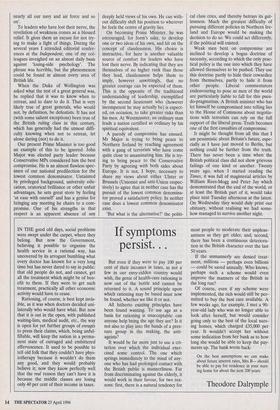If symptoms
persist.. .
IN THE good old days, social problems were swept under the carpet, where they belong. But now the Government, believing it possible to organise the health service in a rational way, has uncovered by its arrogant bumbling what every doctor has known for a very long time but has never dared to say in public: that old people do not, and cannot, get all the treatment which might be of ben- efit to them. If they were to get such treatment, practically all other economic activity would have to cease.
Rationing, of course, is best kept invis- ible, as it was when doctors decided uni- laterally who would have what. But now that it is out in the open, with published waiting-lists, medical audit, etc., the way is open for yet further groups of enrages to press their claims, which, being unful- fillable, will keep the nation in a perma- nent state of outraged and embittered effervescence. It used to be possible to tell old folk that they couldn't have phys- iotherapy because it wouldn't do them any good, and they would probably believe it; now they know perfectly well that the real reason they can't have it is because the middle classes are losing only 40 per cent of their income in taxes. But even if they were to pay 100 per cent of their incomes in taxes, as not a few in our envy-ridden country would wish, the genie of health-care rationing is now out of the bottle and cannot be returned to it. A sound principle upon which rationing may be based must now be found, whether we like it or not.
All hitherto existing principles have been found wanting. To use age as a basis for rationing is unacceptable: can anyone help being the age they are? Is it not also to play into the hands of a pres- sure group in the making, the anti- ageists?
It would be far more just to use a cri- terion over which the individual exer- cised some control. The one which springs immediately to the mind of any- one who has had prolonged contact with the British public is mannerliness. Far from discriminating against the elderly, it would work in their favour, for two rea- sons: first, there is a natural tendency for most people to moderate their unpleas- antness as they get older, and, second, there has been a continuous deteriora- tion in the British character over the last 50 years.
If the unmannerly are denied treat- ment, millions — perhaps even billions — could be saved annually. Who knows, perhaps such a scheme would even improve the manners of the British in the long run?
Of course, even if my scheme were implemented, the rich would still be per- mitted to buy the best care available. A few weeks ago, for example, I met a 90- year-old lady who was no longer able to look after herself, but would consider going only to the best of the local nurs- ing homes, which charged £35,000 per year. It wouldn't accept her without some indication from her bank as to how long she would be able to keep the pay- ments up. The bank wrote back: On the best assumptions we can make about future interest rates, Mrs B— should be able to pay for residence in your nurs- ing home for about the next 200 years.
Theodore Dalrymple


























































 Previous page
Previous page